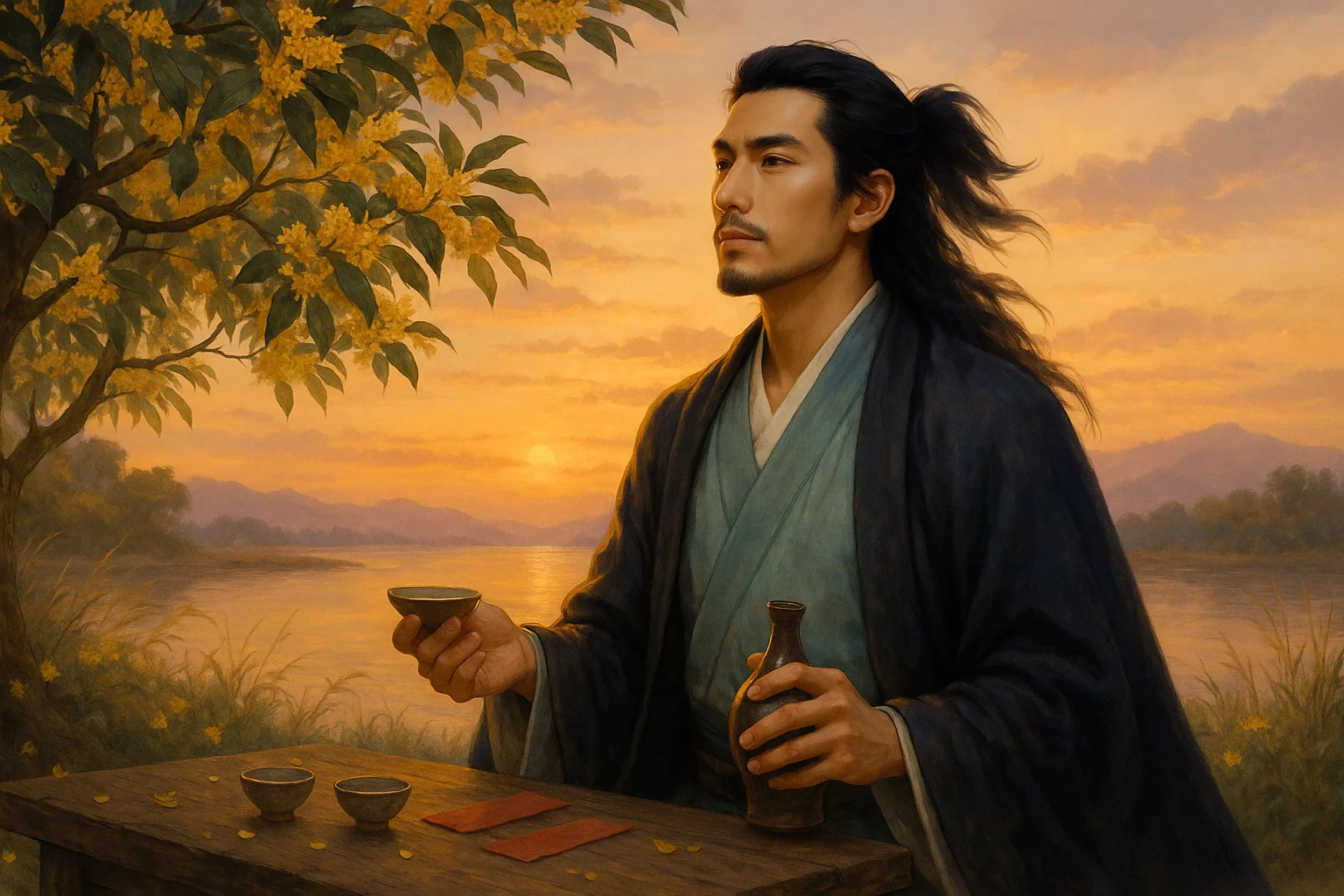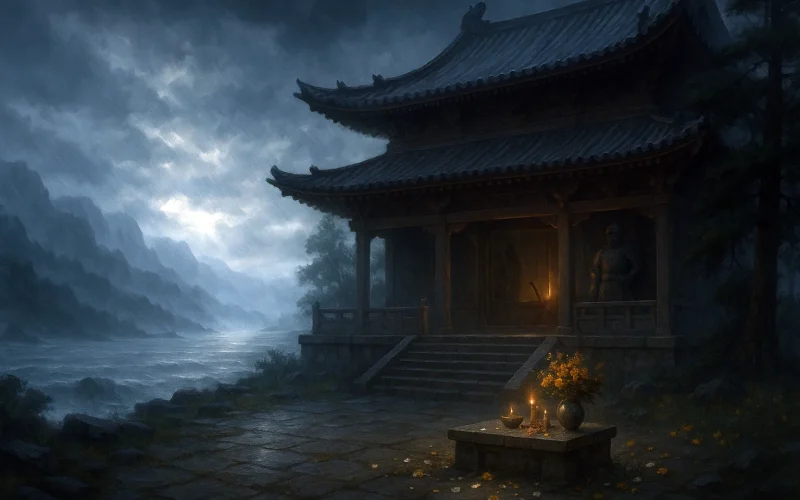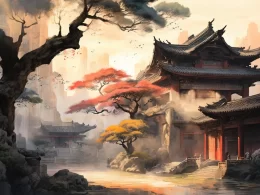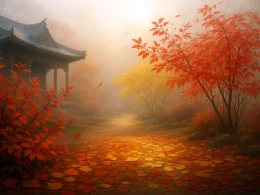At mountain's edge, sparse reds streak the last glow,
Where evening mists entwine, cottages show.
I shift my boat, enticed by sweeter air—
Trifoliate oranges bloom, charming shallow shoal.
Original Poem
「山末」
刘过
山末疏红尾尾霞,晚烟丛薄是人家。
移船更喜吹香好,枸橘药开媚浅沙。
Interpretation
Composed by Liu Guo, a renowned Southern Song lyric poet known for blending boldness with delicacy, this five-character quatrain captures a twilight scene at mountain's edge. Likely written during travels, the poem depicts the poet boating through wilderness to discover a harmonious tableau of sunset clouds, mist-veiled dwellings, and medicinal blossoms. Though brief, the work embodies Liu's serene communion with nature and his gift for finding wonder in subtle landscapes.
First Couplet: "山末疏红尾尾霞,晚烟丛薄是人家。"
Shān mò shū hóng wěi wěi xiá, wǎn yān cóng báo shì rén jiā.
At mountain's edge,
sparse crimson clouds
trail like soft feathers;
through mist rising
from thickets—
human dwellings emerge.
Liu paints with atmospheric economy. "Sparse crimson clouds" (疏红) captures sunset's fading intensity, while "trail like soft feathers" (尾尾霞) transforms light into tactile texture. The revelation of "human dwellings" (人家) amid "misty thickets" (晚烟丛薄) achieves poetic alchemy—wilderness and habitation harmonized in twilight's veil.
Second Couplet: "移船更喜吹香好,枸橘药开媚浅沙。"
Yí chuán gèng xǐ chuī xiāng hǎo, gǒu jú yào kāi mèi qiǎn shā.
Moving my boat,
I rejoice in fragrance
borne on the breeze—
medicinal oranges bloom,
enchanting shoals
with their glow.
Kinetic and olfactory delight converge here. "Moving my boat" (移船) initiates discovery, while "fragrance borne on breeze" (吹香好) suggests nature's intentional generosity. The "medicinal oranges" (枸橘药)—Poncirus trifoliata—symbolize healing beauty, their blossoms "enchanting shoals" (媚浅沙) through chromatic radiance rather than gaudiness, embodying Song aesthetic ideals of subtle allure.
Holistic Appreciation
This miniature masterpiece traces a journey from distant observation to intimate encounter. The first couplet's panoramic vista (mountain edge, trailing clouds) frames human presence as emergent mystery within nature. The second couplet shifts to sensory immersion—boat motion triggering fragrant epiphany, medicinal blossoms transforming barren shoals into sites of enchantment.
Liu's genius lies in compression: twenty characters contain vertical depth (mountain to shoals), temporal progression (dusk to deeper twilight), and sensory layers (visual to aromatic). The poem becomes a meditation on attention—how shifting perspective reveals wonder in overlooked spaces.
Artistic Merits
- Chromatographic reduction
"Sparse crimson" (疏红) distills sunset's spectrum into essential hue. - Tactile meteorology
"Trailing like soft feathers" (尾尾霞) renders light palpable. - Ethnobotanical poetics
"Medicinal oranges" (枸橘药) bridges herbal wisdom and aesthetic pleasure. - Luminous understatement
"Enchanting shoals" (媚浅沙) achieves maximal effect through minimal diction.
Insights
Liu's poem reveals how beauty thrives at margins—mountain edges, day's endings, land-water interfaces. The "medicinal oranges blooming on shoals" teach that healing often emerges in barrenness when we adjust our gaze.
For modern readers, the work models ecological mindfulness: Liu's boat movement ("moving my boat") exemplifies deliberate slowing to receive nature's gifts ("fragrance borne on breeze"). In an age of relentless pursuit, this poem reminds us that wonder arrives not through seeking but through patient presence.
Ultimately, the quatrain suggests that human dwellings ("misty thickets") find true belonging only when integrated into nature's rhythms—a vision of harmony still urgent in our era of environmental fragmentation.
About the Poet

Liu Guo (刘过 1154 - 1206), a native of Taihe in Jiangxi, was a ci poet of the Bold and Unconstrained School (haofang pai) during the Southern Song Dynasty. Though he remained a commoner all his life, wandering the rivers and lakes, he associated with literary giants like Lu You and Xin Qiji. His ci poetry is impassioned and heroic, and his verse is vigorous and forceful. Stylistically close to Xin Qiji but even more unrestrained, Liu Guo became a central figure among Xin’s poetic followers.












